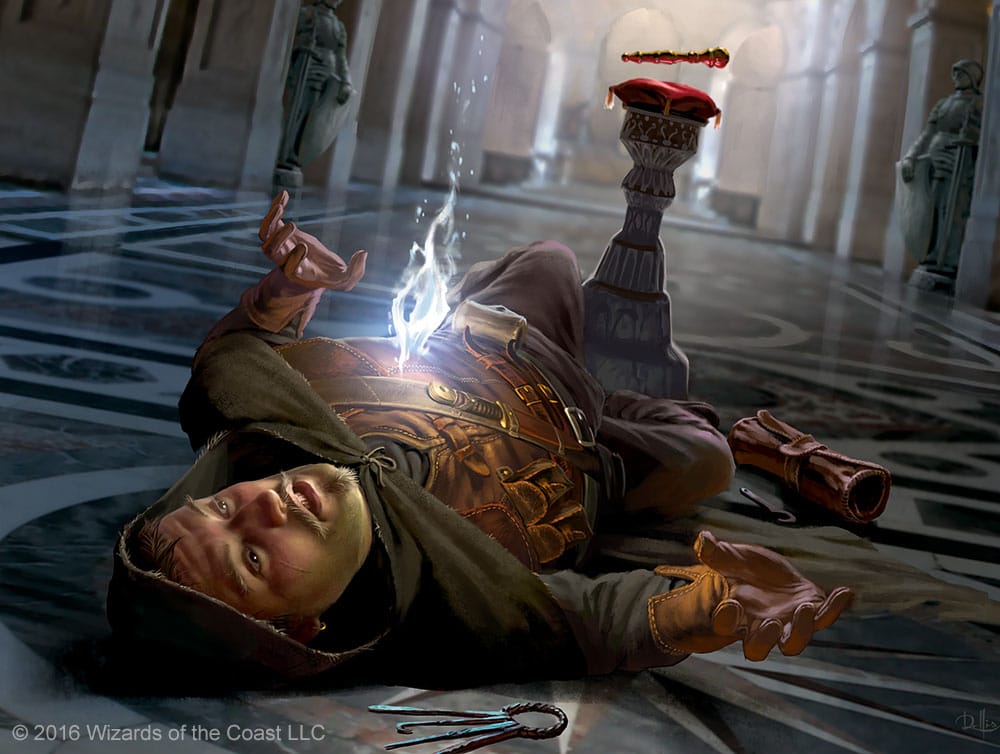Incapacitated 5e
Published on April 3, 2023, Last modified on January 5th, 2024
Learn everything you need to know about incapacitated in Dungeons and Dragons 5th edition, including mechanics, differences from unconsciousness, and more.

Chris Rallis - Wizards of the Coast - Humble
Table of Contents
Incapacitated in D&D
Combat is D&D is usually pretty swingy and can be extremely deadly for a creature that doesn’t have their guard up. Unfortunately, one of the most prevalent conditions that creatures can experience is ‘incapacitated,’ which as the name implies leaves you entirely helpless.
In this guide, we will explore what incapacitated means in D&D, how it differs from other similar conditions, and what mechanics can cause it.
What is Incapacitated in 5e?
According to the Basic Rules, the incapacitated condition has the following effects:
Incapacitated
- An incapacitated creature can’t take actions or reactions.
This is as brutal as it is concise. You may have heard of “action economy” and how important it is to D&D. Because the incapacitated condition restricts you from taking action (yes, even bonus actions) and reactions, it effectively makes you a liability.
Unfortunately, this isn’t where the downsides of this condition stop. There are a couple added implications of becoming incapacitated which aren’t tied to the condition’s wording. Instead, you have to look at class features and other mechanics to see just how dangerous becoming incapacitated can be.
Mechanics Affected by the Incapacitated Condition
Concentration
If you are concentrating on a spell and become incapacitated, you immediately lose your concentration.
Class Features
Becoming incapacitated is the main cause of prematurely dropping a concentration that lasts for longer durations. This includes a barbarian’s Rage, the druid’s Wild Shape, the paladin’s Aura of Protection, and more.
Dodge
If you take the Dodge action on your turn but become incapacitated, you lose the benefit of that action.
Sneak Attack
Let’s say you’re a rogue that wants to Sneak Attack an enemy and you have an ally within 5 feet of said enemy. Great! Sneak Attack time. But, hold on. Your ally has been stunned, and therefore incapacitated, before you could make your attack. Now, unfortunately, you no longer can trigger a Sneak Attack against that creature (unless you somehow find a way to get advantage on your attack).
Athletic Checks
Though the incapacitated condition doesn’t expressly say you auto fail Athletics checks, the rules for the Shove action and grappling a creature both say creatures attempting to shove or grapple an incapacitated creature automatically succeed. Likewise, if the creature you’re being grappled by become incapacitated, the grapple immediately ends.
How is the Incapacitated Condition Applied?
Being such a strong condition, you may be wondering how to use it to gain the upper hand in battle. Or, you might be a DM looking to up the stakes for combat. Either way, here are some of the most common ways to inflict the incapacitated condition.
Conditions
In the game design of 5e, incapacitated is used as a sort of pseudo condition. It’s essentially a keyword that means “this creature can’t take actions or reactions” while also making sure certain passive effects aren’t able to be triggered. So, certain conditions, such as petrified, stunned, paralyzed, and unconscious cause the incapacitated condition. This is easier than spelling out that a creature can’t take actions or reactions and also has their passive ability nulled in each of those conditions.
Spells
There are several spells that inflict the incapacitated condition. There are even more that inflict conditions that apply the incapacitated condition (such as spells that inflict the stunned condition), but those will be touched on in other condition guides:
1st level:
- Hideous laughter
2nd level:
- Nathair’s mischief
3rd level:
- Hypnotic pattern
- Feign death – willing creature only.
4th level:
- Banishment
- Raulothim’s psychic lance
5th level:
- Banishing smite
- Modify memory
7th level:
- Modify memory
Incapacitated Vs. Unconscious
While incapacitated and unconscious might seem similar, they fill different rolls in the 5e ruleset. When a character is unconscious, they are also incapacitated, but they have additional restrictions. A character who is unconscious automatically fails any Strength and Dexterity saving throws, drops whatever they are holding and falls prone, attacks against them have advantage, and if an attack from within 5 feet hits it automatically does critical hit damage. In contrast, an incapacitated character can still make saving throws and doesn’t grant advantage to attacks against them.
Incapacitated 5e FAQs
Can you take a bonus action while incapacitated?
No. The condition says you cannot take actions while incapacitated, which include bonus actions.
Are you incapacitated while sleeping?
Yes. Sleeping means you under the effects of the unconscious condition. This condition also includes the caveat that you are incapacitated.
Can an incapacitated creature concentrate?
No. When you are incapacitated you immediately lose concentration on your spells.
